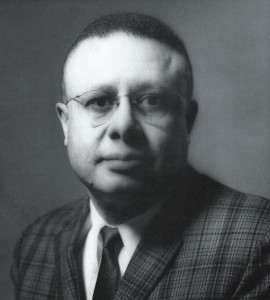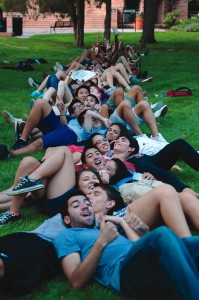The Butler Center’s story begins with the Colorado College Class of 1940. Student Ellis Ulysses Butler ’40 was one of the college’s first African-American students. The account of his time at CC depicts both struggle and success. Butler recognized that his years as an undergraduate provided value to his career and his life, despite challenges and tensions that accompanied his experience as a minority student. Butler invested in the college financially for years, including a significant gift in 2009. He committed to ensuring that other African-American students, and all who attend Colorado College, will have a more positive and inclusive experience.
Butler’s many contributions created a bit of confusion around identity: The Ellis U. Butler Center for Intercultural Leadership is a part of CC’s residential community, located in the lower level of the Lennox House. That facility serves as a place for student groups to host meetings, provides a quiet area for students to study, and offers space for a variety of events, workshops, and trainings.
The Butler Center, headed by Paul Buckley, assistant vice president, also was funded by Butler’s investment and opened with the start of the 2014-15 academic year to take on what Buckley calls a strategic and intentional charge for the CC community.
“The Butler Center is the future,” said Buckley of its role on campus. “We are a forward-minded, progressive-thinking institution, and The Butler Center is a critical part of that work. As an evolution of the Office of Minority and International Students, The Butler Center continues to support underrepresented students and students of color as CC’s hub of diversity, inclusion, intercultural exchange, equity, and empowerment for all students.”
Buckley, the former assistant dean of undergraduate students at Dartmouth College, worked throughout the first part of the academic year to reconnect with many of the communities and individuals on campus historically connected to OMIS. Part of that work included exploring issues related to inclusion and equity with students, faculty, and staff, assessing CC’s present climate and culture to establish a baseline for the center’s goals. Buckley was encouraged to learn that work at CC began before his arrival in July.
“CC’s process of interrogating what diversity and inclusion meant to this place, how its structures and practices were aligned with its thinking about diversity and inclusion—or not—were underway. I saw it as an opportunity for me to come in and join the work, facilitate the work, and lead the work; but it’s work that several others are doing with me, collaborative work.”
Buckley acknowledges that diversity, inclusion, equity, and empowerment can sometimes be buzzwords in higher education. By facilitating campus dialogue, The Butler Center will help align the college’s practices, policies, and structures to reflect a deeper understanding of those terms.
“To look forward, we have to confront what is present and that is often challenging,” Buckley said. “Aspirations without a good understanding of our present condition become empty dreams. It’s very important that we’re able to confront our current realities in order to work toward the hopes and aspirations we have for the college and ourselves as individuals.” Part of facilitating that understanding is helping people find the vocabulary to engage in the dialogue, which Buckley says can be uncomfortable. “We help people find their voices and empower their voices, so we can all engage in a dynamic learning process.”
Along with being a resource to help people to negotiate and engage in what can be challenging conversations, The Butler Center also provides mentoring, advises student organizations, and offers support to help students through various difficult experiences. In the works: a comprehensive mentoring program to be implemented for the 2015-16 academic year, strengthening and expanding the internship program newly titled “Butler Fellows,” and developing opportunities for faculty, staff, and students to learn to be effective allies in conversations around diversity, inclusion, and equity.
Buckley says everyone at CC is responsible for contributing to a transformation on campus. Engagement and full participation are both critical to the idea of inclusion.
“If you find there’s a hindrance to your aspirations, to your learning or development, that’s where we find the work, where the rubber meets the road and we need to dig in,” Buckley said.
It is work that is constant and continual. Mistakes will be made, but Buckley says CC will strive to create a place where members of the community can heal, forgive, and encourage one another, while also holding each other accountable to a higher standard of living and learning.
“It’s an evolving process of engagement that allows for every individual member in the CC community to fully participate in all aspects of the community’s aspirations. An inclusive community is an aspirational community; what we are aiming to develop here is something special and that suggests that we recognize each other as being special, having something very important to contribute.”

